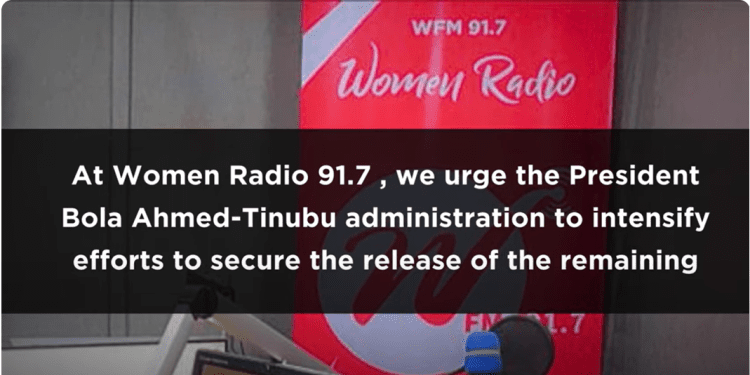Parents of Chibok School girls who were kidnapped in April 2014 are still expressing optimism about the safe return of the girls who are still in captivity ten years after the incident.
It would be recalled that two hundred and seventy-six girls were abducted from Government Girls Secondary School in Chibok, Borno State by terrorist groups in 2014 and there have been reported cases of escape and rescue at different points in time. In May 2017, the Nigerian Government secured the release of over 80 girls and several others are still missing till date.
In a documentary produced by Women Radio 91.7 FM to mark the 10-year anniversary of the Chibok attack, the parents of the girls lamented how the government has neglected them without making efforts to ensure the release of the remaining school girls.
Specifically, the Women Radio team demanded that President Bola Ahmed Tinubu’s administration intensify efforts to secure the release of the remaining 93 CHibok Girls and Leah Sharibu, the only Dapchi girl and other women and children in captivity.
In the documentary, a victim’s parent, Mary Jacob, expressed her desire to see her daughter return to her safe and sound, despite that it’s been a decade since she was kidnapped.
Jacob said “my wish is just for my daughter to come back home safely, that is my only problem. The government should bring my daughter back, that is my prayer. We have been facing so many problems.”
Speaking about the impact of the abduction on her well-being, Jacob explained that, “if your daughter has been taken for 10 years, it will definitely give you high blood pressure and I also have heart issues too, before the abduction, I was fine but now I have been thinking a lot because of my daughter.”
While speaking on a radio show hosted by Women Radio to launch the documentary and mark the 10th anniversary of the kidnap, Bunmi Dipo-Salami, the Executive Director of BAOBAB for Women’s Human Rights said it is disheartening that there are still over 89 girls who are missing, stressing that “it is expected that state actors will take actions and ensure the other girls are reunited with their families.”
Dipo-Salami noted that the lack of inclusion of women in the security architecture of the country is a major challenge which has made it difficult to rescue the remaining girls.
She said “we have to demand accountability, we need to ensure that the rights of women are protected wherever they are and ensure that the remaining girls are reconnected with their families.”
Kunle Adebajo, Head of Investigations at HumAngle, called on the media to continue to put the spotlight on issues of attacks and kidnapping in the country, specifically the Chibok girls story.
Adebajo also added that the “media should pay attention to safe schools initiatives that Nigeria is committed to and journalists should continue to ask for institutional reforms, beyond tokenism and that the Chibok girls that are still missing be reconnected to their families.”
Speaking on capital punishment as a way to stop attacks and insecurity in the country, foremost human rights lawyer, Barr Femi Falana (S.A.N.) said capital punishment is not the best solution but would only be a diversion from the real issues.
“There are over 3000 people on death row in Nigeria but the Governors are usually weary of endorsing the death warrants. So, any capital punishment might not work.”
He said the media should put a spotlight on the alleged mismanagement of funds allocated to the Chibok girls and their families, adding that such will generate refreshed interest from Nigerians about the struggles of the parents, the rescued girls and those still in captivity.
For her part, Yemi Adamolekun, the Executive Director of Enough is Enough Nigeria (EiE) said it is important that the media utilizes the Freedom of Information Act to access information from the government and use such to mount pressure, to ensure that the necessary things are done.
Earlier, Zuwaira Gambo Commissioner for Women Affairs and Social Development Borno State said the Borno State Government has been providing necessary support to the rescued/escaped girls.
In a note that she sent across to the Women Radio team, Gambo said the girls were rehabilitated and enrolled in a school “called Second Chance School designed for victims of the insurgency who had their education truncated, Gender Based Violence Survivors and other vulnerable women and girls.
“It turned out to be a perfect choice for our daughters. The government moved them out of the Rehabilitation Center to a safe space solely acquired to give them the homely ambience to help with their complete healing and eventual reintegration into the society.”

